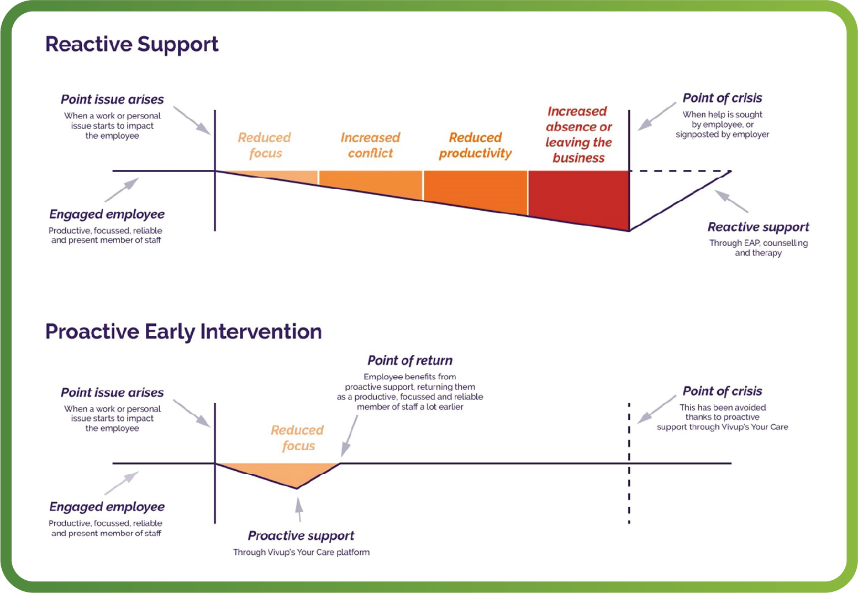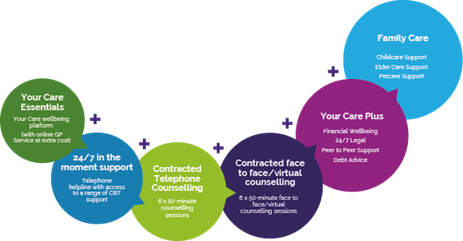Protecting your People with Preventative Care
Contents
When it comes to looking after our wellbeing, many people, for many reasons, choose to seek help once they are past the point of need. Not only does this offer no benefit to the individual (or their organisation), but it also takes a huge toll on our country’s struggling mental health services.
With 1.86 million people making contact with NHS mental health services before the end of 2023, the number of people needing support is at its highest – and steadily rising. This has left us at a crucial point, with resources reaching capacity and personal problems worsening as a result of going untreated.
What the Stats Say
In the latest Holding It Together report published by the Employee Assistance Programme Association, a staggering 640,250 people accessed their Employee Assistance Programme (EAP) in 2022 alone. Of this number, 434,250 (68%) were offered dedicated counselling sessions. This means that approximately 1.357 million sessions were provided that year.
Currently, organisations are advised to use BACP accredited counsellors as part of their mental health provision. This is because BACP counsellors have completed a minimum of 450 supervised hours and have achieved certain industry standards to achieve this accreditation.
While you might think there are millions of counsellors available to meet this demand, the BACP register shows that there are only around 50,000 counsellors in this country. Just 10% are BACP accredited.
That equates to 5,000 counsellors delivering 1.357 million counselling sessions per year. As more people hit the point of crisis, causing demand to rise further, the more reliance there will be on those providing counselling. When that resource reaches capacity, there are simply no more counsellors available to provide this service via EAPs.
The image below shows the trajectory of both reactive support (addressing issues once they have reached crisis point) and early intervention (addressing issues the moment they develop). It outlines the damage that will be done to the employee - and their organisation - if a person fails to receive preventative support.

When a Niggle Becomes a Nightmare
In order to address issues before they worsen, an employee needs to recognise the feeling of today being different than yesterday. Potentially manifesting as an inability to concentrate, irritability, insomnia, or low mood, it’s important people realise action should be taken early and essential they know where to find support.
However, many people don’t take action – perhaps through fear, shame, stigma, or simply because they don’t feel like they have the time. At some point or another, we’ve all been guilty of resigning ourselves to coping.
Think of it like toothache. It starts as a niggle, but you don’t do anything about it. The pain becomes a dull ache, but still, you leave it. Over time, your brain develops ways to cope with the pain until you reach a point where you don’t even realise it’s there. The pain just becomes part of you.
The reality is, the pain is still there - you’re just coping with it. Well, mental wellness works in the same way.
With toothache, you can address the cause of the issue fairly easily. With mental health, it’s not as easy to fix the underlying issue. Therefore, early intervention is key – regardless of what the problem might be.
Much like a toothache will develop until it ultimately becomes infected, the scenario below shows the course of not dealing with an issue as soon as you recognise it is starting to have an impact:
When our brains reach capacity, we’re filled with thoughts that make it difficult for us to focus on the things we should be focusing on, like our jobs, our relationships, and even our own wellbeing
- A person might be worrying about an issue that appears to be straightforward, but when that worry starts to impact them in a way that their focus at work is reduced, it signals the time when action must be taken
- After worry sets in, a person may find that they have a shorter fuse than normal and become more affected by things that, ordinarily, they might have been able to let go of
- When that starts to manifest at work, we tend to see increased conflict and a reduced ability to concentrate and problem solve. This in turn impacts productivity and, when productivity is impacted, the downward spiral deepens
- When someone is in this downward spiral of an emotionally unwell state, one thing impacts the next – and so on. It then becomes harder and harder to ‘rewind’ to their normal self
- The person reaches a point where they are now worrying about their job being impacted, on top of worrying about the initial issue
These emotional problems can quickly manifest into physical problems, such as:
- Musculoskeletal issues
- Difficulty breathing
- Panic attacks
- Blurred eyesight or sore eyes
- Sleep problems
- Fatigue
- Muscle aches and headaches
- Chest pains and high blood pressure
- Constipation or diarrhoea
- Feeling sick, dizzy, or fainting
- Developing rashes or itchy skin
- Changes to period or menstrual cycle
- Existing physical health problems getting worse
In the best-case scenario, these issues can lead to the employee needing time off work. In the worst-case scenario, they can exacerbate to such an extent that the employee is let go. That’s because, rather than addressing the underlying issue that is impacting their emotional wellbeing and manifesting as physical illness, many people will leave their roles instead of reaching out for help.
Evidence tells us that:
- 1.68 people experience mental health problems in the workplace
- 12.7% of all sickness absences in the UK can be attributed to a mental health condition
- Better mental health support at work can save businesses up to £8billion a year
When we feel as though our problems are spiralling in this way, we tend to look for other areas where we can gain back some control. Often, those methods of gaining control are unhealthy or damaging. This can include:
- Substance abuse
- Overeating
- Gambling
- Self-harm
- Avoidance and denial
- Negative self-talk
- Isolation
- Procrastination
- Anger/aggression
- Excessive screen time
Counselling: A Guiding Compass for Life’s Challenges
Early access to counselling can provide ways for your people to gain control in a positive, solution-focused way. Instead of asking, “Why are you doing this?”, a counsellor will ask, “What can you do about this?”
A trained professional has the tools to make people see that, while they might not have control over the issue that is troubling them, they do have control over their response to the issue.
Often in the workplace, an employee’s first indicator of trying to regain control is by coming in late or leaving early. They might not have any control of their finances, their relationship, or the things that are happening around them, but they do have control of when they arrive at work and when they leave.
However, managers tend to look at the effects of someone’s actions rather than the cause of their actions. Instead of asking why they are late or leaving early, they should be asking the employee how they are. By posing this very simple question, they might be providing the first (and sometimes, only) opportunity for the employee to open up about what’s going on.
Managers can then signpost to the correct support pathway, effectively catching the employee before they fall. If they do not respond until that employee has reached the point of crisis, the employee will have spiralled to a degree where they need to regain control for various issues stemming from a bigger problem – requiring multiple counselling sessions and more time off work.
Early intervention enables a person to deal with one singular issue, rather than a collection of compounded issues
The Right Support, at the Right Time
At Vivup, we focus on providing employees with in-the-moment support via early, easy access to qualified counsellors. However, we also recognise that not every issue is solved by counselling.
Think of an employee who is suffering from a financial shock, for instance. Instead of using counselling as a one-size-fits-all approach, we can connect people to practical advice around a situation that’s causing them worry – including financial issues and debt management. This is a problem that can be resolved quite easily before it worsens, but it’s not going to be resolved by counselling. It will be resolved by advice and guidance delivered through professional services who specialise in this area.
While we do provide multiple counselling sessions, as with any EAP, our focus is on getting people the support they need – when they need it.
We’re here to let your staff know that, if they recognise something is happening within their life that is causing them worry – not matter how big or small – they can reach out, get practical advice or emotional support, and utilise the services that are available to them through their EAP.
Our fully trained, accredited professionals are not here to judge. They are here to support and guide employees with the wisdom they have gained through years of education and experience. If staff can recognise an issue as it develops, they will be able to pick up the phone, talk to a counsellor that same day, and have one, impartial, confidential, constructive conversation that can help them find the best way forward.
Our whole-health, complete care solution to preventative support includes:

Ready to prioritise proactive, preventative care with an EAP that does it all? Email wellbeing@vivup.co.uk for more information.
Sources
Mental Health Services Monthly Statistics, Performance November 2023 - NHS Digital
EAPA-Holding-It-Together-report-2023.pdf
BACP Register of Counsellors and Psychotherapists
Mental health at work: statistics | Mental Health Foundation
Physical health and mental health | Mental Health Foundation